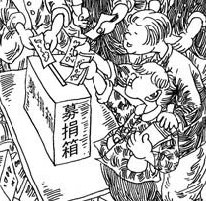Where lives and loves lie in ruins
By Li Xing (China Daily)
Updated: 2008-05-15 07:26
Updated: 2008-05-15 07:26

Three sleepless nights have passed since the earth jolted and shook the whole country Monday afternoon.
Tears keep swelling up in our eyes as we see towns and cities reduced to rubble and watch victims, especially young girls and boys, helped out of twisted concrete.
Many of us feel helpless knowing that tens of thousands are trapped under fallen concrete or buried or missing in landslides, as a result of the great earthquake with its epicenter in mountainous Wenchuan, Sichuan province.
We have kept searching, and waiting for more breaking news about the towns and villages from where we have not heard a single voice. The fate and well-being of perhaps hundreds of thousands of people still remain uncertain.
Among them is Chen Jia, a young reporter who joined China Daily only last December. She and seven other young journalists from Beijing were passing by the Baihua Bridge on their wayfrom the Wolong Panda Reserve to Dujiangyan in a bus when the earthquake struck. As rocks fell and landslides followed, the state highway 213, between Dujiangyan and Wolong-Wenchuan, was cut off.
A local who traveled with them walked all the way from the bridge back to Dujiangyan to report their plight. They were stranded on the bridge, with little food and water. Luckily, they were rescued and back to safety yesterday.
Although Wenchuan covers an area of 4,087 sq km, the earthquake has caused tremendous fatalities hundreds of kilometers away from the epicenter, where telecommunication and satellite communications are being restored.
Pingwu, more than 1,000 km to the northeast of Wenchuan, was also hard hit, with more than 1,000 people killed or missing. Nearly 80 percent of the houses in the town, that had a population of 19,000, collapsed.

My family visited Pingwu a few years ago, on our way to the Wanglang Nature Reserve. We loved the small county town for its tranquility and easy-going life, and we were even awed by the well-preserved primitive forest, a habitat for the giant pandas.
It was there I listened to the reserve director Chen Youping talking about how important the primitive forest has been not only to the local ecology but probably also to our mother river, the Yangtze.
Now we remain in shock at the news that the county, with a population of more than 190,000 is practically cut off from the outside world as roads are blocked and bridges fallen.
Sichuan, known for its beautiful landscape, its ancient culture, the giant panda and above all for its easy-going and generous populace, is now in pain.
Several of my colleagues have gone into the devastated areas while others spend extra hours digging deeper and wider for as much news and stories as we can put together and report to the world.
In Beijing, blood banks are getting full; yet people are still queuing up. An Indian colleague of mine talks about going to Sichuan as a volunteer.
I felt inadequate for not being a soldier, or a surgeon, or an expert rescue worker to be able to be on the scene, using my own hands and expertise to rescue at least one or two of the trapped ones alive. I believe a lot of people share the same feeling.
That's why everyone I've met these past few days discusses with me what more we can do. While we pray for the people still missing and trapped in the rubble and send in all the help we can, we have to do our jobs and in our own way, contribute to the strengthening and enhancement of our support and aid systems.
E-mail: lixing@chinadaily.com.cn
(China Daily 05/15/2008 page8)
|
|
|
|